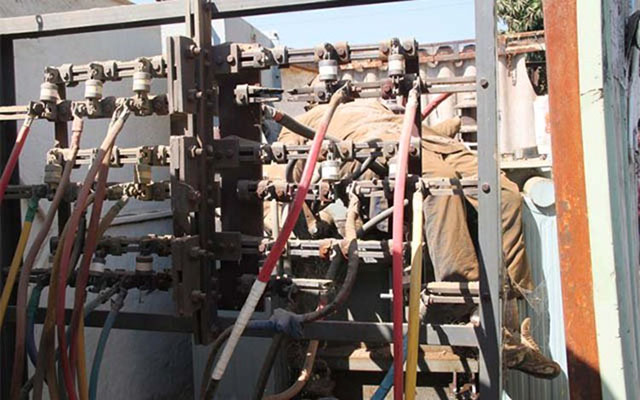Transformer vandalism needs to be tackled


An unidentified man was electrocuted while trying to pilfer oil from a transformer in Glen View last year. — (Picture by Tariro Kamangira)
Collen Murahwa Features Correspondent
Over the last few months, households in Zimbabwe have been affected by longer than usual power outages caused by transformer vandalism and component theft.
Suburbs in Harare such as Sunridge, Mabelreign and Greystone Park have periodically been left in darkness during this winter season due to these crimes.
Families have been crying foul as they may go for extended weeks without electricity, suffering a great inconvenience. Transformer oil, which happens to be the most pilfered component is said to be used to manufacture homemade candles and lamps as well as wax polish for floors.
A Marlbrough resident, Marlyn Badza said there were several cases where they had to suffer weeks without electricity due to transformers problems.
“The electricity situation in our neighbourhood has been bad. We have had to endure the agony of spending weeks in the dark due to transformer oil having been stolen.
“When we report the cases to ZESA they tell us that they are waiting for new transformers to be procured, a never ending process it seems,” she said. The rate of occurrence has also been curious. “If I remember well about seven transformers have been drained off their oil this year alone in our area and each time it causes an extended blackout,” Badza said.
The preventive measures are not being fully implemented, in her opinion. “There needs to be better security measures in place in order to solve this inconvenience. Perhaps a tightening of security by employing security guards to safeguard the transformers could ensure that nothing goes wrong.”
She added; “There must be something fishy going on and with the way the people at ZESA are treating the issue, it gives us a lot of suspicion.” ZESA acknowledges the challenge and urges residents to play an active role in eradicating the worrying trend.
ZESA Holdings Group Stakeholder Relations Manager Fullard Gwasira bemoaned the vandalism of transformers and the high cost of replacing them. “The unplanned power outages that have affected consumers in Mabelreign and the surrounding areas are largely due to the scourge of theft and vandalism.
“Transformers are not breaking down by themselves. Criminals are draining oil from the transformers resulting in the systems burning. This oil provides both insulation in the transformer and act as a coolant to prevent high temperatures,” he said
According to Mr Gwasira Harare has over 36 000 transformers and some 1 200 need repairs or replacing due to vandalism. This issue has not only affected residents in Harare but is a nationwide crisis.
“We are not facing this issue in Mabelreign or Harare alone, it is a national problem. To date 4 000 transformers need to be replaced having been vandalised the cost of which to do so is over $20 million,” he said.
Explaining the reason why some areas have to go for weeks without electricity, Gwasira said the transformers are imported and the cash crisis doesn’t help
“The situation we are facing has been compounded by the shortage of foreign currency which has made it difficult to source spare parts for those transformers that are not beyond repair.”
He added that putting human security at each base station cannot be sustainable for the debt ridden power parastatal. “Due to the geographical dispersion and number of transformers that are on the network countrywide, it is not possible to guard every residential transformer but only primary substations.
“However, ZETDC will explore every means possible to ensure that service is restored to the affected consumers,” he said. According to Gwasira the parastatal is working on ways to ensure that transformers are safeguarded from theft.
“ZETDC has employed a number of strategies to counter the vice and these include engaging communities to form neighbourhood watch committees, public awareness campaigns, securing transformers using Rapid Response alarms, installation of surveillance cameras and use of air cooled transformers
“ZESA is also regularly partnering with fellow public utilities and law enforcement agents for joint security operations to protect the infrastructure,” he said
Calls were also made for the public to collaborate with authorities in curbing acts of vandalism and theft. “Consumers are also urged to utilise the Deloitte Tip Off facility, report to ZESA loss control or the police to furnish information relating to such vandals in strict confidence,” said Gwasira.
The Zimbabwe Republic Police is equally concerned about the cases of transformer vandalism and theft. Police chief spokesperson Senior Assistant Commissioner Charity Charamba said whilst the issues are prevalent, they are working together with ZESA in order to clamp the vice.
“We hold joint operations with ZESA in order to arrest the people who temper with ZESA transformers. “Recently in Mutare two people were jailed, one got 90 years and the other one 50 years for tampering with ZESA transformers,” she said.
Harare West has been among the affected areas and the authorities there have been courting Zesa trying to get reprieve. Member of Assembly in Harare West, Jessie Majome says there is a way in which a residents can finance the security of their own transformers.
“I engaged the Minister of Energy and Power Development on why ZESA and the police do not detect transformer oil theft. I also made a suggestion to the Minister that they should stop charging urban residents Rural Electrification Fund and reinvest that money in the physical security of transformers as well as alarm systems,” Majome said.
She added; “I am saddened that 13 transformers in Harare West alone have been vandalised by transformer oil thieves, leaving many residents who pay electricity in advance in the dark.”
The power situation in urban areas has also brought anxiety to farmers on the outskirts of cities and towns who are affected by similar issues. Electricity supply has a massive bearing on the farming communities especially during the winter season.
Farm Manager at Kwayedza Farm in Mashonaland Central, Godwin Mawire, raised concern over frequent blackouts that have put them at a risk of losing out on projected yields.
“We face the risk of losing out on projected tonnage because of unexplained power cuts and as you know with winter farming, we solely rely on irrigation so we need electricity,” he said.
Zimbabwe Commercial Farmers Union (ZCFU) president Mr Wonder Chabikwa said erratic electricity supply militates against their plans as farmers end up losing a substantial amount of their yields.
“Wheat growing areas are not put under load shedding but however, we have had received reports from some of our farmers on electric faults. “Any crops grown in winter are powered by irrigation hence electricity is required at all times.
“Farmers suffer great loses if electric faults take too long to be rectified; moisture is very pivotal for the growth of wheat hence if a farmer cannot irrigate because of blackouts there are more likely to lose between 10 percent and 90 percent of their yields,” he said.
The loss of electricity supply due to vandalism has long term adverse effects on communities and the economy. Students in schools have been affected, households have had to discard perishables and business which rely on electricity forced to shut down.
ZESA must find suitable solutions to deal with this crisis and communicate better with residents when a fault is realised.
- Feedback: [email protected].









Comments